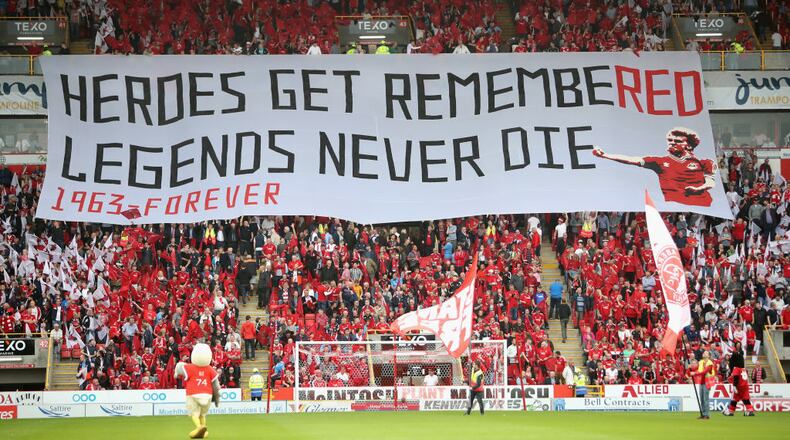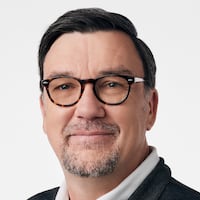Atlanta United’s history, though filled with the glitter of silver and gold trophies in its first three years, is still being constructed.
Aberdeen, the club that Atlanta United’s parent company bought a stake in a month ago, dates to 1903.
Established as the leader of Aberdeen’s new ownership group, chairman and Atlanta resident Dave Cormack can recite The Reds’ players’ and coaches’ names, exact dates and scores off the top of his head with the ease of a man reading a two-item grocery list given to him by his wife.
Cormack grew up in Aberdeen, known for its granite – a group of stone-cutters from the area immigrated to Atlanta in the 1890s and brought soccer with them – and its oil and natural gas. He attended his first game in 1969, when he was 10 years old. His uncle lifted him over the turnstile so only one ticket was needed. They sat in the famed Beach End of the venerable and still-in-use 106-year-old Pittodrie Stadium. Aberdeen drew Dundee United 0-0.
Cormack is hoping to take the $13 million he invested, his rich experience with the club, what he’s learned as an Atlanta United season-ticket holder and his successful experiences as a software business owner and investor to turn Aberdeen into a consistent European qualifier, one that hopes to even the playing ground in the Premiership with long-time powers Celtic and Rangers.
“I feel really blessed,” he said. “This all felt natural.”
Cormack’s love of Aberdeen came from his mother’s side. His father’s family grew up in Edinburgh supporting Hearts. The Cormacks lived modestly. Cormack’s father worked on Saturdays, so when Dave Cormack attended games typically it was his mother’s brothers who would take him. One uncle, Kenny, now in his late 80s, still attends every home game. Kenny celebrated his 15th birthday in 1947 on the day Aberdeen first won the Scottish Cup.
Cormack grew into adulthood and moved to London, where he lived for nine years. He moved to Atlanta 24 years ago with the intention of staying for a few years and moving back. Business flourished. His family grew and put down roots in the same house in which he and his wife still live, with his children and grandchildren less than a mile away.
Cormack sold one business in 2000. Aberdeen and Scottish football were in some financial difficulty because of future TV broadcasting revenues failing to materialize. Cormack helped out the club.
Cormack sold another business in April 2016 for $800 million.
He tried to retire, but after six months, his wife told him that she married him for better or worse, but not for lunch. Go find something to do.
That something was Aberdeen.
Cormack was good friends with long-time chairman Stewart Milne. They began discussing an investment and succession plan where Cormack and his partners would own a large percentage of the club, he would become chairman and Milne would remain on the board.
It took 24 months before an agreement was concluded. Blank, and Atlanta United through Arthur M. Blank Sports and Entertainment, were part of the investment group putting in more than $2 million. Atlanta United President Darren Eales also sits on Aberdeen’s board. Eales and Cormack had nurtured the potential relationship for three years. The total investment by Cormack and his partners is now more than $20 million.
Cormack immediately went to work, taking ideas he had and those shaped by his experiences at Mercedes-Benz Stadium for Atlanta United games to try to improve the club and fan engagement.
First, the club recently completed a $20 million training center that bears his name. Former Aberdeen manager Sir Alex Ferguson, who led the club to two European trophies, attended the grand opening.
Cormack wants Aberdeen to develop players, whether its own or those it scouts and signs, and sell them and he wants to do it in a collaborative way with Atlanta United. Aberdeen can share its knowledge of players across Europe. Atlanta United can share its knowledge of players in South America. The sharing can be mutually beneficial. For example, Cormack reveals that Aberdeen were aware of Alfredo Morelos before he joined Rangers but couldn’t afford his $1 million transfer fee. Morelos, with 11 goals in 16 league matches, is being scouted by big European clubs who aren’t scared of a price tag of likely more than $20 million. Cormack said Aberdeen could have alerted Atlanta United to Morelos, giving the club a chance to sign, develop and sell.
Aberdeen used to be a developing and selling club, but that has become more difficult because the club lacks the scouting clout and transfer money of Celtic and Rangers, whose wage bills for the first team Cormack said are six times more than his club’s.
In what may be considered the ultimate compliment by some, Cormack said he and Blank share many of the same philanthropic ideas and thoughts on how people should be treated. Cormack and his wife have a foundation that supports the Aberdeen FC Community Trust, which employs 30 coaches and gives back more than £1 million per year to the Aberdeen community, including underprivileged families where parents can take their kids to Aberdeen games. Aberdeen as a club has a rich history of philanthropy and activism in its communities, recently winning UEFA’s prestigious award as Best European Professional Football Club in the Community as proof.
That philanthropy may be borne of Cormack’s upbringing in the small metro area of Aberdeen, which has a motto of Stand Free. The area has just 400,000 people in Aberdeen and Aberdeenshire. Cormack said the soccer club’s history is one of inclusiveness, free of the religious bigotry that permeates Celtic and Rangers.
Cormack hopes to build Aberdeen a new stadium. He estimates it will cost $60 million and take 4-6 years. He and the board and working with consultants on what is possible.
Cormack knows that he wants both at Pittodrie and the potential new stadium for those attending to be treated with respect. He went undercover at a recent home game to watch how the stewards interacted with supporters. He didn’t like some of what he saw. Changes were made. He said the difference was immediately noticed. It needs to be more like at Mercedes-Benz Stadium and other venues in the U.S., which he said is excellent at ambassadorship. A team of Atlanta United employees, including Eales, recently spent five days at Aberdeen discussing some of their practices.
“It’s a small thing, but an important thing,” he said. “I want to treat people like I want to be treated myself.”
Cormack wants to create a more raucous atmosphere for home games to replicate what Aberdeen supporters provide for the team at away games. A 3,000-seat section of the stadium is going to be general-allocation seating and will carry the nickname the Red Shed. Cormack hopes the supporters who want to sit in that area will arrive early and be raucous but respectful.
“Encourage the fans to be active,” he said. “Let them decorate the shed and make as much noise as they want.”
There also will be sections in the new stadium for families with children, and food prices will be reduced to be much more affordable, another idea borrowed from Mercedes-Benz Stadium.
Put these ideas and practices together, and Cormack hopes it helps Aberdeen consistently qualify to play in the Europa League and advance into the group stages. It is the only club in Scotland to have won two European trophies.
Cormack hopes to create more history and more dates, names and sites that others will be able to recite, just like the 2-1 win over Real Madrid in Sweden for the UEFA Cup Winners’ Cup and the victory over Hamburg in the European Super Cup.
Atlanta United can help.
“We just believe that in the long-term club collaboration across continents is going to grow,” he said.
About the Author
Keep Reading
The Latest
Featured



